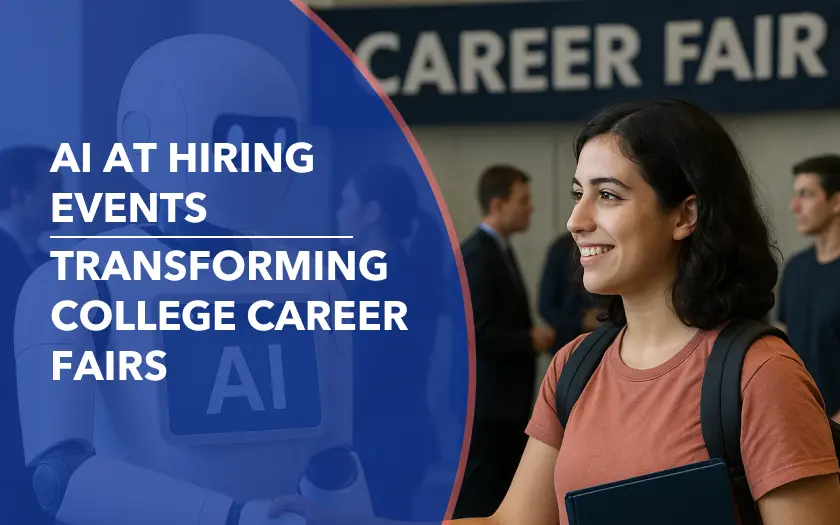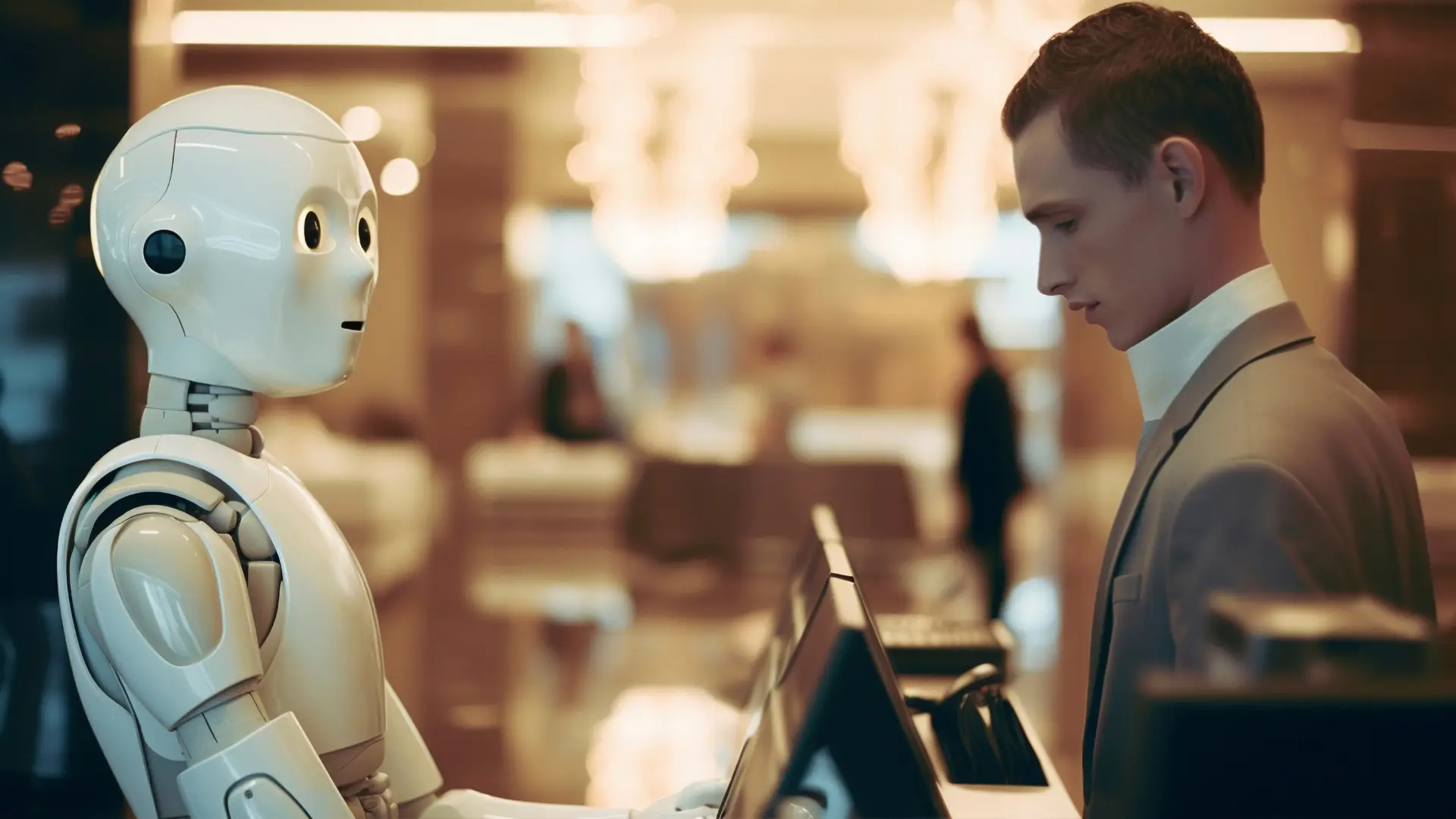AI at Hiring Events: Transforming College Career Fairs


Remember when college career fairs meant paper résumés, long lines, and the sound of recruiters politely pretending to remember names? Those days are fading fast. The next generation of campus recruiting is here, and it’s powered by artificial intelligence.
AI at hiring events is transforming how students and employers connect. From intelligent matchmaking to predictive analytics, automation is streamlining the entire recruiting journey. For universities, it’s a game-changer in logistics and engagement. For employers, it’s a faster, smarter way to find top talent. And for students, it means more relevant, personalized career opportunities.
In this article, we’ll explore how AI is reshaping hiring events on college campuses, what’s driving the shift, and how forward-thinking schools and employers can build smarter, more human recruiting experiences through technology.
{{table-of-contents}}
Why College Hiring Events Need an AI Upgrade
Traditional college hiring events had their charm, but also plenty of pain points. Long lines, rushed conversations, and stacks of paper résumés made the process feel more like a logistical headache than a personal networking opportunity. Recruiters could only meet so many students in a day, and students often left unsure if they’d made a lasting impression.
As campuses became more hybrid and recruiting shifted online, those challenges grew harder to ignore. Employers needed ways to reach qualified candidates beyond the physical fairgrounds, while universities looked for smarter tools to manage virtual engagement. Early virtual event platforms helped bridge the gap, but most focused on presentation rather than connection. The result? A digital version of the same old problem: limited interaction, minimal personalization, and missed opportunities.
That’s where AI at hiring events comes in. Rather than replacing human interaction, AI enhances it. When integrated into modern virtual event platforms, AI can analyze résumés in seconds, match students with the most relevant employers, and even predict which conversations are likely to lead to job offers.
- For universities, this means smoother event management, deeper insights, and stronger engagement across hybrid and virtual formats.
- For employers, it opens access to a wider, more diverse talent pool, without the manual workload.
- For students, it transforms what used to be a stressful, hit-or-miss experience into something far more personalized, efficient, and genuinely human.
In short, AI and virtual event platforms are redefining what college hiring events can be, turning them from crowded halls into intelligent ecosystems where real connections happen effortlessly.
Gen Z’s Push for Personalization: The Force Behind AI-Driven Hiring Events
If there’s one thing Gen Z has made crystal clear, it’s this: one-size-fits-all is over. This generation grew up with personalized playlists, algorithm-driven recommendations, and same-day delivery. So when they show up to a career fair, they expect that same level of speed, customization, and interactivity. Long queues and generic recruiter pitches just don’t cut it anymore.
AI at hiring events delivers exactly the kind of experience Gen Z craves: fast, seamless, and personal. Instead of students wandering aimlessly from booth to booth, AI-powered systems can instantly match them with employers whose roles align with their skills, interests, and goals. Some platforms such as Remo, even recommend conversation starters or suggest companies based on a student’s résumé and engagement history.
For recruiters, this level of personalization isn’t just a nice-to-have, it’s a competitive advantage. AI hiring tools help them identify high-potential candidates in real time, prioritize meaningful conversations, and build stronger connections from the start. And when all of this happens within an AI-enabled virtual event platform, it creates a fluid, interactive environment where networking feels natural, not forced.
Ultimately, Gen Z doesn’t just want opportunities, they want relevance. They’re drawn to events that respect their time, understand their preferences, and offer authentic engagement. By combining AI with modern event technology, universities and employers can meet those expectations head-on, creating hiring events that feel as intuitive and dynamic as the generation they’re designed for.
How AI Is Transforming Hiring Events

Artificial intelligence is redefining how universities, employers, and students connect at modern hiring events. From smart event matchmaking and real-time coaching to automated scheduling and analytics, AI at hiring events is transforming traditional career fairs into dynamic, personalized experiences that feel intuitive, efficient, and human.
1. AI for Event Organizers: Efficiency and Experience
Running a large-scale hiring event means managing thousands of schedules, sessions, and touchpoints. AI for event organizers streamlines that complexity and ensures every interaction counts.
AI-powered scheduling tools automatically coordinate time zones, availability, and booth capacity, removing the back-and-forth of manual planning. Predictive analytics highlight when engagement is likely to dip, helping hosts adjust schedules or send prompts in real time.
AI reporting dashboards visualize booth traffic, attendance patterns, and conversation metrics, enabling data-driven decisions as the event unfolds. Post-event summaries provide organizers with actionable insights to improve future events, turning each fair into a smarter, continuously learning system.
Forward-thinking universities are even experimenting with VR and AI-enhanced career fairs, immersive 3D environments where students can “walk” through digital booths and meet AI-guided avatars. These innovations create memorable experiences for digital-native students and help institutions stand out in a crowded recruitment landscape.
2. AI for Employers: From Volume to Value
Recruiters have long faced the same challenge: too many résumés, too little time. AI-powered hiring tools are changing that by automating the heavy lifting and surfacing high-potential candidates before the fair even begins.
AI-powered matching systems analyze candidate profiles, skills, and interests to align them with employers seeking similar attributes. That means less sifting through résumés and more time engaging with qualified candidates.
Smart note-taking tools automatically record and summarize recruiter–student conversations, capturing key takeaways and next steps for faster follow-ups. Meanwhile, conversational AI features, like Remo’s Icebreaker Question Generator, help recruiters move beyond small talk and start meaningful, authentic conversations that highlight personality and cultural fit.
By automating repetitive workflows such as screening, note-taking, and scheduling, AI in recruiting frees teams to focus on what matters most: building genuine relationships that lead to better hires.
3. AI for Students: Confidence and Clarity
For students, walking into a career fair, virtual or otherwise, can be intimidating. AI at career fairs helps them feel prepared, confident, and supported at every step.
Before the event, AI career coaching tools help students polish résumés, identify their strengths, and even rehearse conversations through simulated interview practice. These systems guide students toward employers who align with their goals and interests.
During the event, real-time chatbots act as personal assistants, answering questions like “Which recruiter should I talk to next?” or “How do I book a one-on-one session?” This ensures students spend their time networking productively instead of getting lost in logistics.
After the fair, AI continues to add value through personalized job matches, learning resources, and timely reminders that keep students engaged long after the event ends. By analyzing each participant’s interactions and career interests, AI helps sustain meaningful connections and momentum between students and recruiters, ensuring the impact of the virtual fair extends well beyond the closing session.
Key Takeaway
AI is transforming hiring events for everyone involved, employers, students, and organizers alike. By blending automation with empathy, AI enables more inclusive, personalized, and data-driven experiences that make every conversation more meaningful.
Whether it’s matching candidates, analyzing engagement data, or automating logistics, AI at hiring events is not just improving efficiency, it’s redefining what meaningful connection looks like in the modern hiring landscape.
Best Practices for Using AI at Hiring Events
.webp)
By now, it’s clear that AI isn’t just an add-on for college hiring events, it’s becoming the foundation for how schools and employers connect with emerging talent. But like any technology, success depends on how it’s used. When done thoughtfully, AI in events can make recruiting more personal, more inclusive, and more effective. When rushed or misapplied, it can feel cold or transactional.
To help you strike the right balance, here are some best practices to keep in mind when using AI at hiring events.
1. Lead With People, Not Platforms
The best hiring events don’t start with software, they start with purpose. Before choosing any AI tool, define what kind of experience you want to create. Are you helping first-year students explore career paths? Connecting employers with graduating seniors? The technology should support your goal, not the other way around.
Automation is at its best when it removes friction, not personality. Use it to streamline logistics like, scheduling sessions, sending reminders, and tracking sign-ups, so that recruiters and students can focus on real conversations. AI should make space for the human moments that matter, not crowd them out.
2. Match Early, Connect Faster
One of the biggest advantages of AI at hiring events is its ability to match students and employers before the fair even begins. Intelligent matchmaking systems analyze student interests, skills, and goals to pair them with relevant employers, setting the stage for higher-quality interactions.
This pre-event alignment means both sides walk in more prepared. Employers can tailor their pitches, and students can approach booths knowing who might actually be a fit. Platforms like Remo make this even easier by letting participants schedule one-on-one chats or small group sessions ahead of time, turning cold introductions into warm conversations.
For event organizers, it’s important to clearly communicate these benefits and encourage both recruiters and students to use the matchmaking tools early. When participants take advantage of these features in advance, the live event runs more smoothly, and the quality of connections improves significantly.
3. Keep Accessibility Front and Center
An often-overlooked benefit of virtual and hybrid hiring events is accessibility, and AI plays a key role in expanding it. Captioning, real-time translation, and voice-to-text tools ensure that language or hearing barriers don’t stand in the way of opportunity.
AI can also support more equitable hiring practices. For instance, anonymized résumé screening tools, often powered by AI, help reduce unconscious bias by allowing employers to focus on skills and fit rather than demographics. On platforms like Remo, adaptive layouts and inclusive design ensure everyone can move through virtual spaces comfortably, whether they’re using a laptop, tablet, or assistive device.
An inclusive event isn’t just fair, it’s smarter. It broadens the talent pool and reflects the kind of equitable workplace culture Gen Z increasingly expects.
4. Use Data to Design Better Fairs
Every event is an opportunity to learn. AI-powered dashboards give organizers and recruiters the kind of visibility that used to take weeks of manual data collection. It can show which sessions drew the biggest crowds, which employers had the most engagement, and what times saw the heaviest traffic.
These insights go beyond descriptive event metrics. They help universities and employers identify what truly drives outcomes, whether it’s specific industries, skill areas, or event formats. Predictive analytics can even forecast attendance or estimate drop-off rates, helping organizers plan more effectively next time.
When post-event reports are used strategically, every hiring event becomes smarter, more efficient, and more aligned with real student and employer needs.
5. Balance Automation With Authenticity
This is where many teams stumble, leaning too hard on automation and losing the personal touch that makes career fairs memorable. The goal isn’t to let technology speak for you; it’s to free you up to speak with people.
Recruiters can use AI for personalized follow-ups, smart note-taking, or identifying top candidates, but the outreach should still feel human. Similarly, students benefit from AI coaching or career guidance, but those insights are most valuable when paired with real mentorship and live discussion.
Remo’s immersive design is a great example of this balance. Automation handles the background logistics, while features like AI networking and virtual tables keep interactions spontaneous and real. It’s proof that you can scale efficiency without sacrificing authenticity.
6. Integrate Feedback Loops
AI thrives on good data, and good data comes from real feedback. After each event, invite both students and employers to share what worked and what didn’t. Use that qualitative input to refine your AI settings, matchmaking criteria, and event design.
For example, if attendees mention that certain sessions felt overcrowded or that matchmaking didn’t feel accurate, those insights can inform adjustments before the next fair. Over time, the system becomes more intuitive, the experience more personal, and the results more impactful.
Think of it as an evolving partnership between humans and technology, each learning from the other.
Building More Human Hiring Events with AI
Here’s the funny thing about AI, it’s not really about the tech. At its best, it’s about people. It’s about creating more time for genuine conversations, surfacing opportunities that might’ve been buried in a résumé pile, and making hiring events feel less like a transaction and more like a connection.
When thoughtfully applied, AI doesn’t replace the human touch, it boosts it. It takes over the tedious stuff: scheduling interviews, sorting through applications, and analyzing engagement. But what it gives back is invaluable–your time, empathy, and focus. Instead of worrying about logistics, recruiters can really listen. Students can focus on telling their stories, not just their stats.
That’s where platforms like Remo come in. By combining automation with an immersive, people-first design, Remo helps organizers create hiring events that feel intuitive, efficient, and engaging. As the future of hiring continues to evolve, one thing’s clear: the best AI won’t just make events more efficient; it’ll make them more human. If you’re ready to see what that looks like in action, book a demo with Remo and experience how immersive, AI-enabled hiring events can connect the right people at the right time.
Frequently Asked Questions about AI at Hiring Events
1. How can AI simplify or automate tasks during hiring events?
AI at hiring events helps organizers and recruiters save hours on manual tasks like scheduling, candidate matching, and follow-ups. Intelligent systems can automatically pair students with relevant employers, send reminders, and track engagement, all while freeing up teams to focus on meaningful interactions instead of logistics.
2. What types of AI tools are commonly used at hiring events?
AI tools used at hiring events include résumé screening software, chatbots for candidate engagement, scheduling assistants, and predictive analytics dashboards. Virtual events platforms like Remo also integrate AI-powered networking and booth management tools that make the experience smoother and more interactive for both sides.
3. How does AI improve candidate experience and engagement at hiring events?
By personalizing recommendations, guiding navigation, and enabling real-time interactions, AI ensures students don’t feel lost in the crowd.
4. Can AI tools handle virtual or hybrid hiring events effectively?
Absolutely. Today’s virtual event platforms use AI to deliver seamless, hybrid-ready hiring experiences. From predictive attendance tracking to intelligent matchmaking and virtual booths, AI ensures recruiters and candidates connect effectively, no matter where they are. Platforms like Remo make it easy to create immersive, people-first hiring events powered by smart technology.







.webp)




















